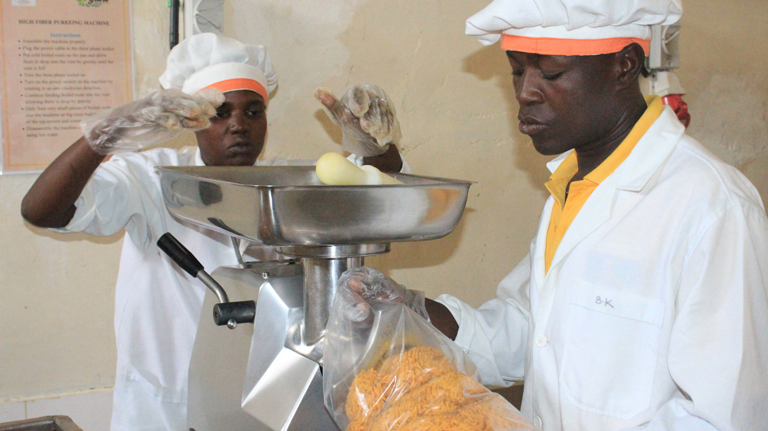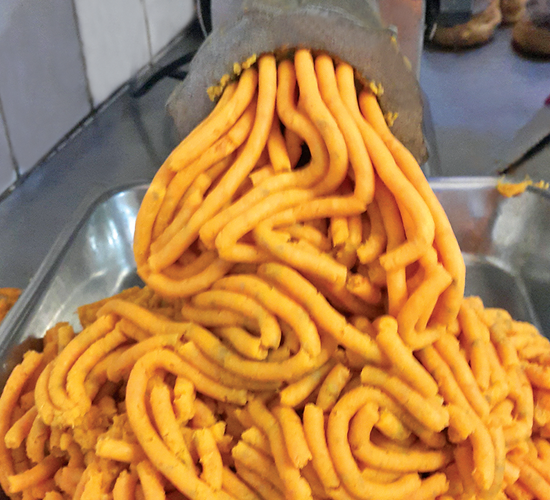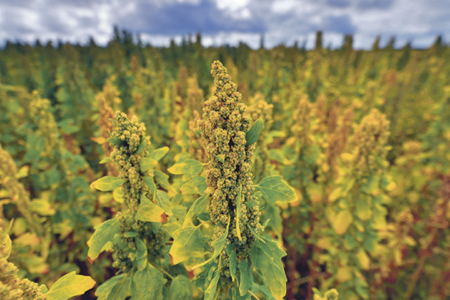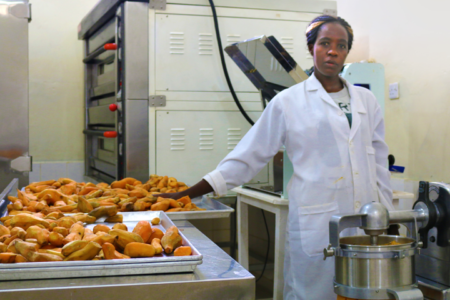
Orange-fleshed sweetpotato (OFSP) puree can be used as a substitute for 30-60% of the flour in a range of baked or fried products, reducing production costs and increasing their nutritional content. International Potato Center (CIP) scientists developed a vacuum-packed storage technology that allows OFSP puree to be stored without refrigeration for months, creating the potential for widespread use by bakeries and food vendors. This project aims to take the OFSP puree for bakery application to scale in Kenya, Malawi and Uganda.
Background
Orange-fleshed sweetpotato (OFSP) puree provides a cost effective and nutritious alternative to wheat flour, since it can replace up to 30-60% of the flour in a range of baked or fried products. It can also reduce the amount of sugar used in dough by as much as 70%, and the amount of oil by 30%, lowering the overall cost of production of wheat based products by 12-20%. The end products are more nutritious than traditional wheat bread and they have high consumer acceptance. Given the increase in demand for healthy diets and OFSP enriched foods, the CGIAR Research Program on Roots, Tubers and Bananas (RTB) provided CIP with a scaling grant to accelerate the use of OFSP puree in the formal and informal food sectors in Kenya, Malawi and Uganda. “Orange-fleshed sweetpotato puree for baked and fried products” is a two-year (2019-2021) project promoting the use of OFSP puree as an ingredient that not only reduces production costs but also improves the nutrient content of baked and fried products.
Due to the perishability of OFSP roots, CIP researchers developed a shelf stable OFSP puree to increase demand for the crop by facilitating its use in baked and fried products. However, there are few puree processors. Processed products in the form of bread and buns are found in the supermarkets, which are mostly accessed by the middle class, but there is limited use of puree in the informal markets (street vendors) where most consumers prefer fried products. Though the puree technology is relatively simple, (procuring roots from local farmers, then cleaning, steaming, and pureeing them using standard small-industrial equipment) investment has been low thus far. Puree producers need a high quality and quantity of roots supplied by farmers. Since the crop is rain-fed, its seasonality affects puree production. Facilitating a year round supply of roots by farmers and continuous supply of puree by processors to meet rising demand remains a challenge. Such challenges impede the scaling up of OFSP puree use. The scaling fund project is identifying bottlenecks such as these along the value chain and committing funds to address each of them to maximize the impact of this innovation.
Objectives of the work
The objectives of the project are to:
- Ensure a reliable and consistent supply of good quality fresh OFSP roots for puree processing.
- Increase production and use of OFSP puree in Kenya, Malawi and Uganda.
- Increase awareness of the nutritional benefits of OFSP among farmers and consumers.
- Increase awareness of the economic benefits of OFSP among producers and processors.

Approach
To scale up OFSP puree processing to reach small, medium and large-scale investors and increase its utilization, the project will work on the weakest bottlenecks identified through a diagnostic survey to ensure:
- Availability and continuous supply of quality OFSP roots;
- Good supply chain management from farm to processing plant;
- Information sharing with producers and processors to align expectations and roles;
- Technical backstopping to factory staff and extension service providers;
- Training of farmers in quality standards and post-harvest handling; and
- Consumer awareness and demand creation among farmers, producers, and consumers.
This project will build on existing networks of OFSP production and processing. The partners of the project include: CIP-SASHA (Kenya and Uganda), CIP-RTC (Malawi), CIP-EU-Bioversity International (Malawi), CIP Kulima (Malawi), CIP-TAAT (Kenya, Malawi and Uganda), CIPBioInnovate (Kenya and Uganda), CIP SUSTAIN (Kenya, Uganda), United Purpose – EU-Bioversity International (Malawi), Farm Concern International (Kenya, Uganda and Malawi) and HarvestPlus (Uganda). The project will also work closely with other partners (organizations, firms, individuals) involved in the OFSP value chain.
Expected outcomes
Increased production of OFSP puree and its utilization resulting from expanded markets will drive economic development, leading to increased investment in the OFSP value chain by the private and public sectors in Kenya, Malawi, and Uganda. This will create employment and income opportunities for women and youth in the project countries. Overall, the increased consumption of OFSP enriched products will lead to the improved nutritional status of women and children at the household level by the end of the project.


Contact
Tawanda Muzhingi
CIP-SSA
t.muzhingi@cgiar.org
Thanks to our donors



